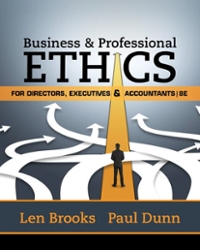In mid-2011, Sino-Forest Corporation was a company with timber operations in China, including tree plantation (holding of
Question:
In mid-2011, Sino-Forest Corporation was a company with timber operations in China, including tree plantation (holding of timber for appreciation and/or harvesting), log and wood products trading, and manufacturing of wood products. Its shares were traded on the Toronto Stock Exchange (TSE) under the TRE symbol, with a total market capitalization in U.S.
dollars of \($4.2\) billion at a share price of $
18.21. However, in a research report dated June 2, 2011, Carson Block, the director of research of Muddy Waters, LLC, alleged that Sino-Forest Corporation was a reverse-takeover (RTO) fraud,1 “a multibillion-
dollar Ponzi scheme... accompanied by substantial theft”, and estimated the real value of a share to be less than \($1.2\) Sino-
Forest share prices plummeted; the Ontario Securities Commission (OSC) investigated the company’s auditor, Ernst & Young, who subsequently settled a class action lawsuit with Sino-Forest’s shareholders for \($117\) million;
PricewaterhouseCoopers was called in by Sino-Forest to substantiate its assets, but the company went bankrupt. Muddy Waters was sued for \($4\) billion for defamation in 2012, but the lawsuit has not proceeded.
In the Introduction and Executive Summary of Research Report,3 Carson Block makes the following allegations:
• Sino-Forest Corp (traded on the TSE as TRE since 2010) has always been a fraud since it reported excellent results from early joint ventures even though the joint ventures never went into operation.
• TRE’s sales transactions for standing timber were fabricated. For example, reported sales in Yunnan province exceeded “the applicable harvesting quotas by six times,” and “transporting the harvested logs would have required over 50,000 trucks driving on two-lane roads winding through the mountains from this remote region, which is beyond belief (and likely road capacity).”
• “TRE massively exaggerates its assets.”
Purchases of trees for planting have been overstated, few legitimate agents have been used, and “the other agents appear to have been laundering money for TRE—moving large amounts of money to an undisclosed subsidiary of TRE and a trading company that TRE does business with. We also see clear evidence that TRE has falsified its books.”
• In order to raise funds, TRE engaged Jakko Pöyry, a valuations company, to provide credible valuation reports on growing trees. However, TRE has been
“all the while giving Pöyry manipulated data and restricting the scope of its work.” According to the Research Report, Pöyry has been allowed to inspect “only 0.3% of [TRE’s] purported holdings.”
• TRE was using offshore companies, including “at least 20 British Virgin Island entities” that obscure the transparency of company operations.
• Forged documents were being used and were not detected by the auditors.
• TRE’s Board of Directors, Audit Committee, and auditors were not sufficiently familiar with the politics, industry practice, language, and culture of the People’s Republic of China.........
Questions:-
1. Describe the fraud that allegedly occurred through Sino-Forest Corporation Inc. Who benefited, and how?
2. Why did regulators not prevent this fraud from occurring? What were they relying on?
3. Why did the directors of Sino-Forest not prevent this fraud from occurring?
What should they have done to discover the problems that were subsequently uncovered?
4. Why did shareholders not foresee this fraud? What were they relying on?
5. Why did Carson Block author the Muddy Waters Research Report? Was he altruistic or self-interested? What did his company stand to gain?
6. What basic assumptions were erroneously made by Ernst & Young that contributed to the audit problems of concern to the OSC?
7. What audit risks become important when auditing in unfamiliar cultures?
8. If you had been on the audit team of Sino-Forest, how would you have avoided allegations of a lack of adequate professional skepticism?
9. If the Chinese system of recording property rights were known to be incomplete, how would you have performed the audit of Sino-Forest’s assets?
10. What audit problem was caused by the Sino-Forest practice of selling timber without receiving cash payments, and how would you have resolved it?
11. What would you do if you were a company director or auditor and you were advised that your company had incomplete or inadequate record creation and retention practices and no integrated accounting system and that employees conducted company business from time to time using personal devices and noncorporate email addresses?
Step by Step Answer:

Business And Professional Ethics
ISBN: 9781337514460
8th Edition
Authors: Leonard J Brooks, Paul Dunn





